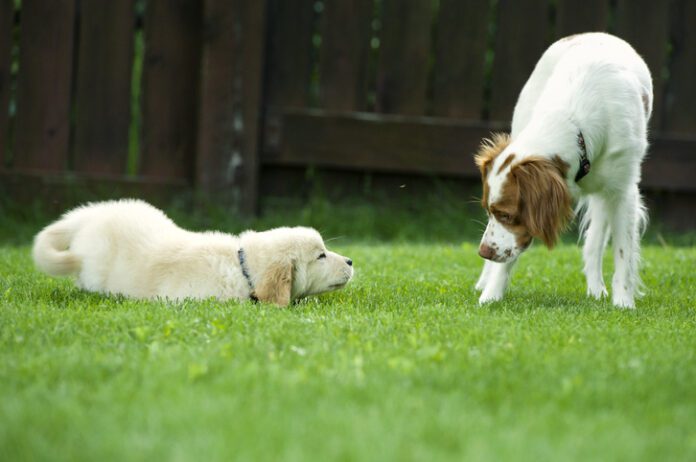Slowly and step-by-step is how to introduce a puppy to an older dog. Adult dogs might respond to the introduction of a new puppy or dog with anything from love at first sight to an effort to ferociously drive the intruder off your property. Careful introductions will increase your chances of having a canine love affair rather than Doggie World War III.
Ideally, your dog loves other dogs and will be delighted to have a canine sibling sharing her home and humans. If so, introductions for dogs are simple:
First, separately tire out both dogs, then let them meet on neutral ground, such as a friend’s fenced yard or a rented Sniffspot – not a dog park. Have both dogs on leashes and let them hang out near each other for a bit; then, if all is well, drop the leashes and let them interact. Be ready to intervene if either one seems too aroused or overwhelmed. Note: It’s perfectly okay for your dog to do some mild snaps to tell the newcomer that he’s being obnoxious. Pups need to learn manners, and an appropriate adult dog is the best teacher!
If your dog is concerned rather than happy about the newcomer, go slower. Keep them restrained in each other’s presence for at least several days as they get used to each other, and use “protected contact” for initial interactions, allowing them to sniff through a wire exercise pen or baby gate. (Don’t use a crate for this – the crated dog will feel trapped and stressed.)
If things don’t go well even with the slower approach, or you already know your dog won’t be happy about the new family member, contact a force-free behavior professional to help with introductions.
Do you think your dog is jealous of the new puppy the house? To avoid stress and jealousy, give both dogs plenty of individual time and attention, and be sure to provide your longer-term family dog with lots of time away from the young ’un – she shouldn’t have to put up with a pesky puppy 24-7!






